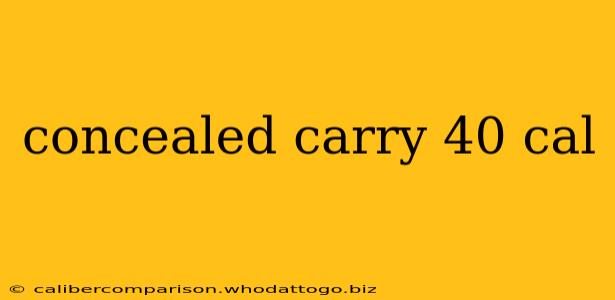Choosing a concealed carry pistol is a deeply personal decision, heavily influenced by individual needs, preferences, and shooting experience. The .40 Smith & Wesson cartridge, a popular choice for law enforcement and civilian self-defense, presents both advantages and disadvantages for concealed carry. This guide will explore the nuances of carrying a .40 caliber handgun, helping you determine if it's the right choice for you.
The .40 S&W: Power and Recoil
The .40 S&W offers a potent balance between stopping power and manageable recoil, at least for many shooters. Its larger cartridge delivers more energy than a 9mm, potentially leading to quicker incapacitation of a threat. This increased stopping power is a significant factor for many choosing this caliber. However, it's crucial to acknowledge that "stopping power" is a complex subject with many variables beyond just caliber.
Recoil Considerations for Concealed Carry
The increased power translates to more recoil. This is a critical factor for concealed carry, particularly for individuals with less experience or smaller builds. Excessive recoil can lead to faster fatigue, slower follow-up shots, and a less controlled shooting experience – all undesirable factors in a self-defense situation. Proper training and practice are paramount to mitigate this.
Concealed Carry Handguns in .40 Caliber: A Look at Popular Choices
Several manufacturers offer excellent .40 caliber handguns suitable for concealed carry. However, choosing the right firearm depends on factors like hand size, grip preference, and overall comfort. Some popular models often cited include:
- Smith & Wesson M&P: Known for its ergonomics and reliability, the M&P line offers various sizes suitable for concealed carry.
- Glock 22/23: Glock's renowned reliability and ease of maintenance make these popular choices, though some find the grip texture less comfortable than other options.
- SIG Sauer P229/P226 (Compact): SIG offers several .40 caliber models with a reputation for accuracy and a refined feel. The compact versions are designed specifically for concealed carry.
This is not an exhaustive list, and many other reputable manufacturers produce suitable .40 caliber handguns. It's crucial to handle and test-fire different models to determine the best fit for your individual needs.
Advantages and Disadvantages of .40 Caliber for Concealed Carry
Advantages:
- Stopping Power: Generally offers more stopping power than a 9mm.
- Wide Availability: Ammunition is readily available at most gun stores.
Disadvantages:
- Recoil: More significant recoil than 9mm, potentially affecting accuracy and control.
- Magazine Capacity: .40 caliber magazines often hold fewer rounds compared to 9mm magazines of similar size.
- Increased Wear: The higher pressure of the .40 S&W can lead to increased wear and tear on the firearm over time.
Beyond the Caliber: Essential Considerations
Choosing a concealed carry firearm extends far beyond the caliber. Key aspects to carefully evaluate include:
- Holster Selection: A high-quality, comfortable holster is crucial for safe and convenient carry.
- Ammunition Selection: Opt for high-quality self-defense ammunition with proven performance.
- Training: Consistent and comprehensive training is non-negotiable.
Disclaimer: This information is for educational purposes only. Always consult with a firearms expert and receive proper training before carrying a concealed firearm. Laws regarding concealed carry vary significantly by location; ensure you are fully compliant with all applicable laws and regulations. Safe gun handling practices are paramount.

